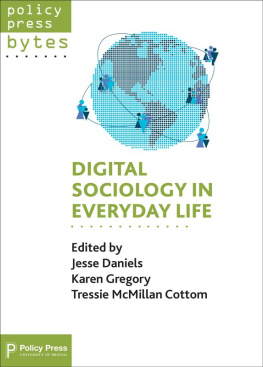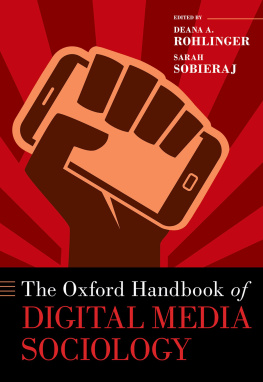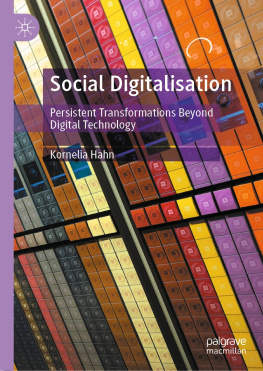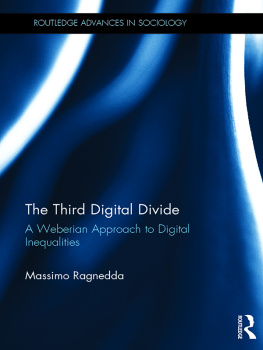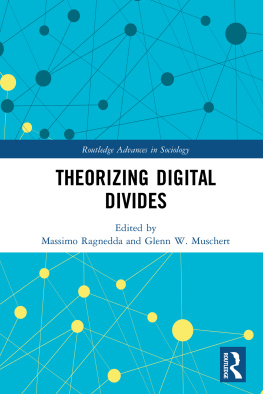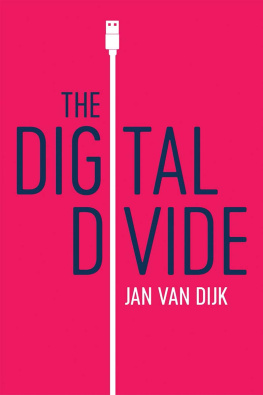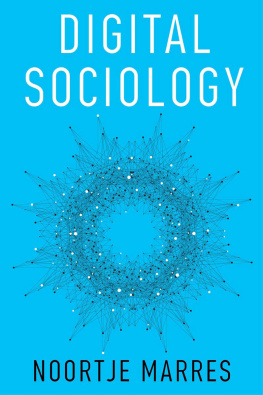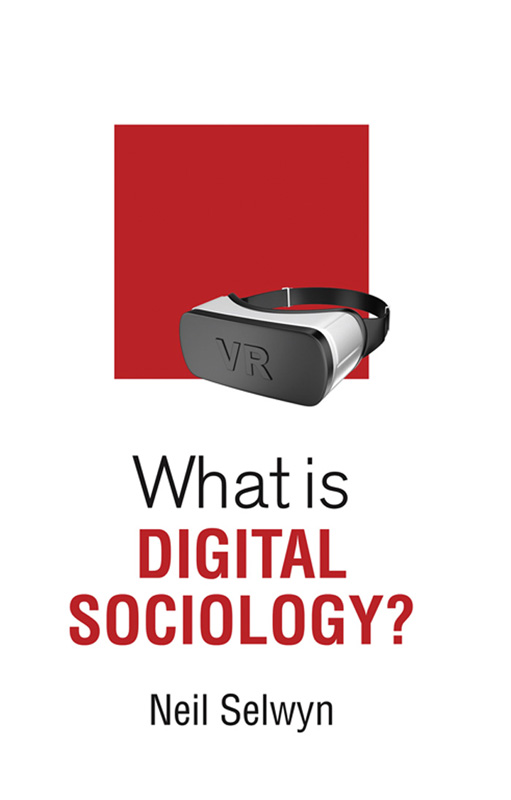Table of Contents
Guide
Pages
What is Sociology? Series
Elisabeth S. Clemens, What is Political Sociology?
Hank Johnston, What is a Social Movement?
Neil Selwyn, What is Digital Sociology?
Richard Lachmann, What is Historical Sociology?
What is Digital Sociology?
Neil Selwyn
polity
Copyright Neil Selwyn 2019
The right of Neil Selwyn to be identified as Author of this Work has been asserted in accordance with the UK Copyright, Designs and Patents Act 1988.
First published in 2019 by Polity Press
Polity Press
65 Bridge Street
Cambridge CB2 1UR, UK
Polity Press
101 Station Landing
Suite 300
Medford, MA 02155, USA
All rights reserved. Except for the quotation of short passages for the purpose of criticism and review, no part of this publication may be reproduced, stored in a retrieval system or transmitted, in any form or by any means, electronic, mechanical, photocopying, recording or otherwise, without the prior permission of the publisher.
ISBN-13: 978-1-5095-2710-6
ISBN-13: 978-1-5095-2711-3 (pb)
A catalogue record for this book is available from the British Library.
Library of Congress Cataloging-in-Publication Data
Names: Selwyn, Neil, author.
Title: What is digital sociology? / Neil Selwyn.
Description: Cambridge, UK ; Medford, MA : Polity Press, 2018. | Includes bibliographical references and index.
Identifiers: LCCN 2018025187 (print) | LCCN 2018027027 (ebook) | ISBN 9781509527144 (Epub) | ISBN 9781509527106 (hardback) | ISBN 9781509527113 (pbk.)
Subjects: LCSH: Sociology. | Information technologySocial aspects.
Classification: LCC HM585 (ebook) | LCC HM585 .S458 2018 (print) | DDC 301dc23
LC record available at https://lccn.loc.gov/2018025187
Typeset in 10.5 on 12pt Sabon by Toppan Best-set Premedia Limited
Printed and bound in the United Kingdom by Clays Ltd, Elcograph S.p.A.
The publisher has used its best endeavours to ensure that the URLs for external websites referred to in this book are correct and active at the time of going to press. However, the publisher has no responsibility for the websites and can make no guarantee that a site will remain live or that the content is or will remain appropriate.
Every effort has been made to trace all copyright holders, but if any have been inadvertently overlooked the publisher will be pleased to include any necessary credits in any subsequent reprint or edition.
For further information on Polity, visit our website: politybooks.com
Preface
A print-based publication might seem a rather old-fashioned means of addressing the question of digital sociology. Indeed, tackling any question these days is increasingly unlikely to involve consulting a book. Instead most people's immediate approach to making sense of the question What is Digital Sociology? is likely to involve turning to Google (or perhaps Baidu, Yandex, DuckDuckGo and other alternative search engines). Some individuals looking for a deeper dive might check Wikipedia or perhaps search a bibliographic database for a couple of algorithmically recommended articles. In contrast, sitting down and methodically working your way through a 40,000-word book might appear a rather long-winded way of going about things.
This abundance of online information reflects the fast-changing nature of scholarship and knowledge. It also flags up the need for sociologists to pay serious attention to the digital. Google, Wikipedia and similar information sources are not simply washing over academic disciplines such as sociology and leaving things unchanged. Instead, these technologies are significantly influencing the ways that knowledge is being developed and disseminated. As such, they are technologies that sociologists need not only to be making clever use of but also developing critical stances toward.
). Among other things, Lupton's book developed a great framework for making sense of digital sociology in terms of digital theory-building, digital methods and digital scholarship. Extending these themes, Marres provided a thorough grounding in the ontological and epistemological challenges thrown up by digital methods of social inquiry and analysis. These four books continue to be must-read references for anyone looking to venture into this area.
). There are a number of themes and principles underpinning our discussions. On the one hand is an awareness of what is taking place outside of sociology. It is important to remember that recent developments in digital sociology have not occurred in a vacuum. In this sense, care needs be taken in locating these ideas in relation to developments beyond the discipline. Indeed, one of the challenges when attempting to talk about digital sociology is the increasingly blurred distinction between straight-ahead sociological work and the mass of cognate work taking place across the digital humanities, new media studies, communications, design and computational subjects. As will be reiterated throughout this book, digital sociology is an inherently interdisciplinary endeavor that spans many different disciplinary boundaries.
On the other hand is the need to remember that this remains a book specifically about sociology. While reflecting on inter/intra-disciplinary cross-overs, we must not forget to emphasize what is inherently sociological about our interests. After all, this is a book concerned with digital sociology rather than digital social sciences or critical digital studies. As such, it takes care to locate current concerns over digital sociology in relation to the bigger picture of sociology. One feature of this approach is a willingness to move on quickly from the surface-level features and novelties of the digital. If we are not careful, discussions of digital sociology can soon get bogged down in excessively descriptive and sometimes exoticized stories of how individuals now encounter and experience the digital. Examining the lived experiences of digitally mediated society is important but must be appropriately grounded in what might appear to be relatively dry issues of social structure, political economy, power relations, and so on. Thus while this book considers a range of current hot topics within digital culture and digital life, it does so within appropriately micro and macro levels of analysis.
If nothing else, this hopefully gives the book a longer shelf life than many other discussions of digital society. Rather than over-focusing on specific instances of how the digital is currently being experienced, this text is concerned primarily with enduring ideas and issues. The arguments, issues and ideas outlined here should remain relevant long after Twitter, Facebook, Mechanical Turk, and so on, have fallen out of fashion. Indeed, there is clear benefit to retaining a strong sense of history when talking about digital society to remain mindful of where our current concerns sit within the history of sociological thought. In this sense, previous discussions of digital sociology have sometimes suffered from not being sufficiently grounded in the discipline's pre-digital work on technology. This book therefore takes care to foreground connections with nineteenth- and twentieth-century sociology both as a rejoinder to ahistorical accounts of digital sociology and as a means of highlighting the strong connections with long-running concerns in mainstream sociology.
's indicative discussions of digital race and digital labor are intended to inspire readers to delve into





